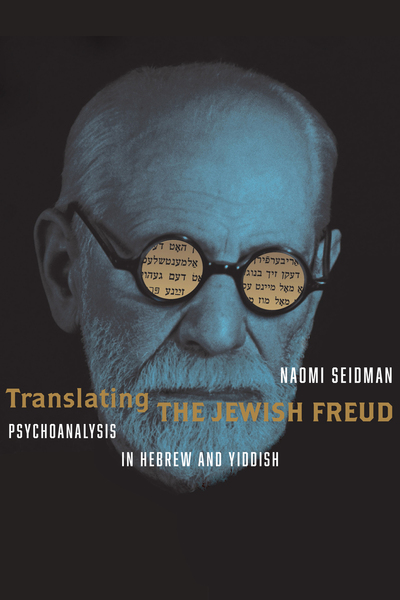
June 2024
364 pages.
from $35.00
Paperback now $17.50 (50% off)
Hardcover ISBN: 9781503638563
Paperback ISBN: 9781503639263
Ebook ISBN: 9781503639270
There is an academic cottage industry on the "Jewish Freud," aiming to detect Jewish influences on Freud, his own feelings about being Jewish, and suppressed traces of Jewishness in his thought. This book takes a different approach, turning its gaze not on Freud but rather on those who seek out his concealed Jewishness. What is it that propels the scholarly aim to show Freud in a Jewish light? Naomi Seidman explores attempts to "touch" Freud (and other famous Jews) through Jewish languages, seeking out his Hebrew name or evidence that he knew some Yiddish. Tracing a history of this drive to bring Freud into Jewish range, Seidman also charts Freud's responses to (and jokes about) this desire. More specifically, she reads the reception and translation of Freud in Hebrew and Yiddish as instances of the desire to touch, feel, "rescue," and connect with the famous Professor from Vienna.
About the author
Naomi Seidman is the Chancellor Jackman Professor of the Arts at the University of Toronto, a National Jewish Book Award winner, and a 2016 Guggenheim Fellow.
"Translating the Jewish Freud is a lucidly argued, innovative, and deeply moving study. It is moving in a double sense: it reframes and moves our understanding of the Jewish Freud away from approaches that seek to 'discover' and 'expose' Freud's Jewishness. Instead, Naomi Seidman surfaces the affective circuits that mobilize and surcharge readerly and writerly desires for Freud's Jewishness. This double movement makes for an utterly compelling experience."
—Ann Pellegrini, coauthor ofGender Without Identity
"In this book, Naomi Seidman continues her amazing journey into the presence of our pasts, with the reader along for a round-trip ride. Language and its charges—of identity, repression, rebellion, and gender—are her continuing leitmotif. Here she examines the many readings of Freud in Jewish, and the many readings of Freud as Jew—all as clues to the cacophony of known and suppressed desires and repulsions that surround Jewish identification tout court."
—Jonathan Boyarin, author of Yeshiva Days
"Translating the Jewish Freud... offers a compelling, quasi-sociological view of how Freud's Jewish admirers translated his works as a sign of prideful acceptance, which Freud himself valued."
—Benjamin Ivry, The Forward